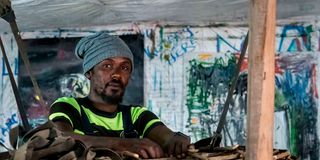Shabu Mwangi: This is how to get partnerships and collaborations as an artist

What you need to know:
- It is not easy finding partnerships and collaborations if you are a community based collective.
- We live in a society where information is not easy to get. I think most institutions have artists who they normally work with locally.
- We didn't apply for collaboration with MATZA, they heard of us and asked if we would like to collaborate.
Shabu Mwangi began practicing art in 2003. He lives and works in Mukuru, where he established the Wajukuu Art Project in 2013 to highlight the lives of disadvantaged minorities in his community. Shabu is deeply concerned by society’s inequality and our lack of empathy for people with different social, political, ethnic, and religious beliefs, and his work seeks to examine human behaviour and probe our collective amnesia.
1. What made you start practicing art? What difference do you feel it has made in your community?
I started the project as way to share my voice and views on things I encounter, and as a way to give voice to my community at a time when unified voices from such environments are fading. The difference that art has made or brought in my community is massive. It has improved our self-awareness and knowledge, and also given identity to people who were once viewed as inadequate compared to other Kenyans.
2. Why the name 'Wajukuu'?
We choose the name after reflecting on a Swahili proverb that says, majuto ni mjukuu. Back then we felt as if we were facing the consequences of mistakes of our parents or grandparents. But with time, we chose to break the chain and be the change rather than the result of past struggles and hardships that our parents faced due to bad governance. We long to be the change, and to live it.
3. How did you get into partnership with MATZA? What ideas do you have around digital informalities? What is the piece you're producing for the exhibition about?
We met a contact from MATZA during Documenta Fifteen, which we took part in last year. Documenta Fifteen is a contemporary art event that happens every five years. We happened to be part of the one that took place last year. The contact from Matza was in Kenya for a short work visit, and while figuring out how to work with local artists, he heard of Wajukuu, and decided to reach out.
My idea is themed on digital informality. It is about how majority of humans never really question technology beyond what it serves. We normally share data digitally without being conscious of it. By questioning this, I choose to not only be a consumer of digital content, but to also use it to empower and impact others through my views, and also to create awareness. My work will focus on creating awareness through digital platforms, hoping the art and voices from within will reflect and radiate outwards.
4. Is it easy to find partnerships and collaborations like MATZA? Which other ones, locally and internationally, has Wajukuu done? How do you apply?
It is not easy finding partnerships and collaborations if you are a community based collective. We live in a society where information is not easy to get. I think most institutions have artists who they normally work with locally.
We didn't apply for collaboration with MATZA, they heard of us and asked if we would like to collaborate. It has always been our dream to host residencies and collaborations. In the past, we have had local collaborations with many collectives including Kuona Trust, and also with individual artists. Currently, more doors are opening for us. For instance, we now do exchange programmes with the German School, and we also collaborate with Goethe Institute.
5. How many people make up Wajukuu? How do you choose members? Who runs the children’s club, and what are you planning to do this year?
Wajukuu Art Collective has 11 members, and has mentored 14 youth who now are the Wajukuu juniors. They have their independent activities within Wajukuu, but we support them with space and sourcing of funds. Choosing new members is really not easy. When someone wants to join our programmes, we give them a chance to volunteer with us during our social services in the community. They then decide whether to stay or not.





